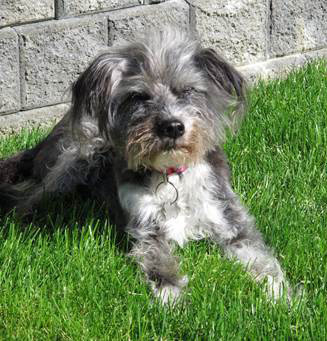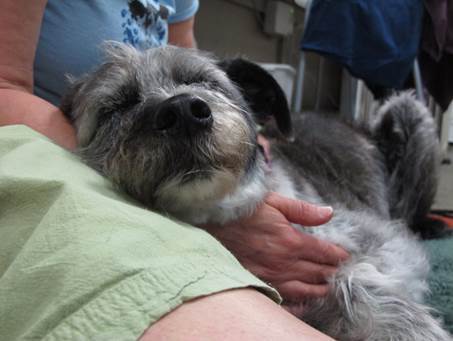The Bladder Meridian Outer Line
Gretchen Deitz, Tallgrass Animal Acupressure Institute
Dezi came to us after the sudden and tragic loss of his human guardian. A 13-year-old terrier mix who looks one-part Tramp (from “Lady and the Tramp”) and one-part David Niven (the debonair actor), Dezi seemed, at first, like a well-balanced dog. But after those first few weeks, we came to realize that Dezi had been traumatized not only by the loss of his human companion, but also by his human’s declining mental health in the final years of his life.
Dezi’s trauma showed itself in many ways. He slept in a tiny little ball on the smallest corner of the couch, trying as hard has he could not to take up space. Particular noises — beeps on the microwave or thuds from doors closing — rattled him so, he’d scurry away to find the darkest corner in which to hide. He ate very little and any change in his routine would trigger colitis — bright red bloody stools with occasional diarrhea. During acupressure and massage sessions he’d either go completely limp — as if he’d left his body — or move away completely. When he stayed and was fully present, sessions lasted only 10 minutes before he decided he’d had enough.
As the weeks progressed, the more clear it became that Dezi was both in emotional shock and deeply grieving. After a consultation with his Traditional Chinese Medicine (TCM) vet, we worked in collaboration on Dezi’s “outer channel.”
The Bladder meridian begins at the corner of the eye and runs over the head, down along the spine, and down each hind limb. The meridian runs 1.5 cun off the dorsal midline, but when it reaches the scapula, it separates into an “Inner Channel” and an “Outer Channel.” While the Inner Channel is used more frequently for organ system sessions and assessment, the Outer Channel addresses emotional well-being.
In TCM, each paired organ system is associated with an emotion. For instance, Liver and Gallbladder are associated with anger while Heart and Small Intestine are associated with Joy. Grief is associated with the Lung and Large and Intestine meridians and while Dezi wasn’t experiencing any “lung” issues per se, he was clearly experiencing Large Intestine problems.
To start, the vet recommended monthly acupuncture sessions where she’d focus on balancing his emotional stability and his intestinal concerns. She’d needle BL 13 and Bl 42 as well as Bl 21, Bl22, Bl 25, Bl 40, and St 36. In between sessions, I worked two points at the most every three days, initially focusing my canine acupressure work on Bl 42 and then assessing his progress and adjusting my point selection as he moved through his grief.
After acupuncture sessions, Dezi would come home and sleep for a good two hours. When he woke, though, he was alert, engaged, and ready for action. His energy increased and his mood was clearly happier and more at peace for about three days. This is when I’d step in and work BL 42 bilaterally. I thought I’d see Dezi bounce back regaining the benefits of his initial acupuncture treatment, but this was not the case. In fact, for about 24-36 hours, Dezi seemed even more grief-stricken, which included an unwillingness to eat and, once again, a tendency toward loose stools.
I consulted the vet again and she said to keep focused on Bl 42, that Dezi’s response was, she believed, a sign that he was pushing through the grief. “It has to go somewhere,” she said, “and we’re more likely to see increased manifestations of grief while his body works through the loss and the unsettling time with his previous family.”

And so I kept working Bl 42 and slowly, as the weeks progressed, Dezi’s moods leveled and his bowel movements became more regular and firm. Soon, I moved away from Bl 42 and focused on what was needed based on the assessment of the Association Points.
Dezi still gets monthly acupuncture from the vet and weekly acupressure from me. While he knows when he’s had enough, our sessions have doubled in length and he’s more willing to let me work temperamental points like those on the paws or his belly. He’s clearly happier too. He walks with his head up and wiggles hello when we come home from work. Meal times are no longer a struggle and though he still has an occasional bout of stress colitis (brought on by dramatic changes to his routine), they are more easily managed. While I know there are moments when he still grieves the loss of his previous guardian, I also know he now feels like a loved member of our family.



